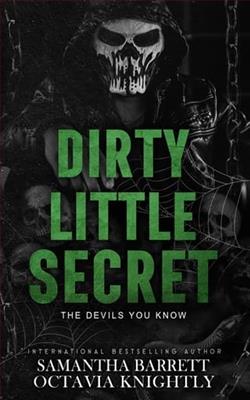Page 34 of Pansies
“So?”
Fen’s jaw pulled tight, like he was biting his lip. For a long moment, he didn’t answer. And then, “It’s not fair,” he burst out. “You shouldn’t be able to do this, and I shouldn’t let you.”
“It’s not only about me. If I had nothing to offer you, nothing you wanted, you wouldn’t have gone with me that night, and you wouldn’t be talking to me now.”
“Don’t flatter yourself, Alfie Bell.” From over his shoulder, Fen flicked him what was probably supposed to be a sardonic look. “If I want a big cock to ride, I can get that anywhere.”
It wasn’t a good time to think about that. Really not a good time. Alfie tried to file the image away before he could get completely distracted by it. (The shift of muscle beneath gold-stippled skin, head thrown back, throat naked, mouth open—wait, stop, stop right now.) “Aye, but you still chose me. You knew exactly who I was and you went with me anyway.”
“I know.” Fen drooped. “And I wish… Oh, I don’t know. How do you always manage to get everything you want? Why do you get to treat me like you did and then expect my forgiveness five seconds after you apologise for it?”
“I’m not asking for forgiveness. I’m just trying to…y’know…put the past behind us.”
“It’s not fair,” Fen repeated, helplessly. “How can I be this stupid and pathetic and miserable? Why are you never the one who suffers?”
Alfie could have disputed that in quite some detail, but itdidn’t seem like it would be helpful just then. “Dunno. But I’m not really sure what to do about it, short of you stickingmyhead down the toilet this time.”
Fen was suddenly quite still. “You shouldn’t joke. You’ve no idea how often I’ve thought about it.”
“About…putting my head down the bog?”
“About getting even. Of making you feel even a tiny bit of what I did.”
“Fuck.” Alfie let out a long breath. He kept thinking he understood. Then realising he didn’t. He felt like the obnoxious one inThe Chronicles of Narniawho Aslan had to rip the dragon scales off. “I really hurt you, didn’t I?”
Fen’s glance was strangely desolate. “Yes, Alfie Bell, you really did.”
The bell jangled into the silence, startling them both. Alfie had practically forgotten he was standing in the middle of a flower shop, holding another guy. And while you could maybe get away with that in London, at least in certain bits of it, this was South Shields. Every instinct he possessed was pulling at him like a Rottweiler on a lead, but he was determined to be better than that. To show Fen—hell, to show himself—he could be better than that.
Except then Fen basically clawed himself free. Leapt so far away it was like Alfie had suddenly started generating a Fen-repelling field. It felt kind of weird—not good—to be on the receiving end of that sort of recoil. What did Fen think was going to happen? That a roving gang of violent homophobes was spot-checking local flower shops for inappropriate male-to-male contact?
He needn’t have worried, though. An old lady emerged through the crack of the laboriously opened door, moving as slowly as if she was made of glass. Fen knew what she wantedwithout having to be told—a single gerbera daisy, the colour of sunrise, which he wrapped up in paper for her like it was precious. The exchange was clearly familiar to them both. A ritual. They didn’t exchange more than a few words, but Fen’s gentleness made Alfie feel strange and awkward. Lonely, somehow.6
And when she was gone, something was different. The quietness in the shop had a heaviness to it now. And Fen…Fen looked breakable, in a way he never had before. Not even when Alfie had been tormenting him.
“You alreet?”
Fen shrugged. “She comes by every Friday. The flower is for her husband.”
Well. That seemed nice. Didn’t it? “Aww,” he tried.
Fen gave him a glittery look. “He’s dead.”
Alfie tried to feel sympathetic. And not totally set up.
“He was in the Royal Air Force. He died in 1944, at the age of twenty-two.”
“Oh. Uh. That’s harsh.” Bloody hell, he was so bad at this. It just seemed too big somehow—as if it could crack open the universe if you thought about it too much, sadness running out like yolk. And, truthfully, Alfie was…a little bit scared of sadness. It was about as alien and taboo as falling in love with men should have been.7 “I mean,” he blundered on, “I’m sorry. Must be hard and stuff.”
Fen, however, had no such concerns. He came at the subject with a kind of fearlessness—a sort of naked, desperate bleakness—that left Alfie unsettled and admiring at once. “I don’t know…how that happens. How you do it—how you keep living with grief. Forever.”
“God, I dunno, mate. My granddad died when I was a teenager, but you sort of expect your grandparents to die, don’t you? I was upset, but it wasn’t really a big deal.”
Fen was silent, arms folded so tightly it looked almost as if he was hugging himself. Alfie could have hugged him instead, but when he reached out, Fen jerked away. Which meant he had to fall back on words. And there were a hundred, maybe a thousand things he wanted to say, but he couldn’t get any of them to line up properly into letters and words and sentences.
“My friend Kitty,” he blurted out finally, “told me that when bad stuff happens, you just sort of learn to live with it. It sort of becomes who you are like.”
It had sounded good when it was coming from Kitty. Here, in a flower shop in South Shields, beneath the scathing gaze of the man who had once been a boy Alfie had hurt, it sounded just plain daft. Hollow as could be.















